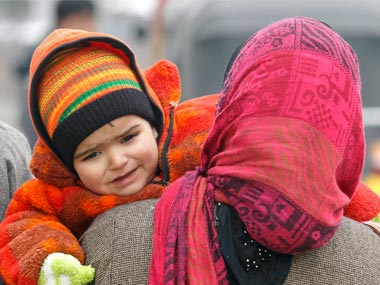Adopting, especially if you are of an interfaith marriage, is not child’s play. Javed Ali and Deepti Sharma, who have been married for 11 years, learnt this the hard way. In August 2008, Javed, a Delhi based social worker, brought home an abandoned girl child from a government medical college in Aligarh. The couple went through a two month procedure including medical tests and documentation to prove to the board of hospital that they were the best among the six couples wanting to adopt the child. Zaara, then 13 months old, became part of the family. The hospital issued the couple with a document certifying the adoption. However, Javed wanted to get the adoption legalised to avoid any trouble in future. [caption id=“attachment_191834” align=“alignleft” width=“380” caption=“The new law will allow interfaith couples the freedom to adopt: Reuters”]  [/caption] Adopting a child under the Hindu Adoptions & Maintenance Act (HAMA) was not possible for the interfaith couple as the law was applicable only to the followers of Hinduism, Sikhsim, Jainism and Budhhism. The Guardians and Wards Act, 1890 (GAWA) allows guardianship as opposed to adoption. The Juvenile Justice Act or JJ Act, 2000, allows adoption only once the Child Welfare Committee (CWC) declares a child legally free for adoption. Aligarh did not have a CWC. In the absence of a CWC, the district magistrate (DM) had the authority to legalize adoption but directed Javed to the CWC in Ghaziabad (Javed lives in Ghaziabad). After one year of paper work, meetings, and more paper work, Javed gave up. “It has been more than two years now. The moment I think that this adoption is not enlisted in government’s records, I get worried. We realize that this can be challenged in the court,” he said. Their concern is shared by thousands of couples in interfaith marriages who, in the absence an adoption act, either look for a window in the current laws or forge documents to show that the child is their biological child. This is one of the anomalies that the Special Adoption Bill attempts at removing. “Once this becomes an Act, it will be on the lines of the Special Marriage Act. Any couple of any religion will have the option of availing this legislation to adopt a child,” said U. Sarath Chandran, member secretary, National Legal Services Authority (NALSA), which has drafted the bill. “The adopted child will be eligible to inherit the property of adoptive parents just like the biological child,” he said. The draft Bill has been formulated by a committee of 17 members including members of NALSA and civil society. Work on the draft began as a follow up initiative of the national seminar on child rights held in May 2011 in Delhi. Under the proposed legislation, an individual or an institution can lodge a complaint with the principle district judge in case of any harassment meted out to the adopted child. “It is the responsibility of the adoption agency to ensure that the child is going in a compatible family. But even after proper checks and balances, there are cases of harassment of the adopted child,” said Chandran.
The Special Adoption Bill has been drafted on the lines of the special marriage act, allowing any couple to use the legislation to adopt a child.
Advertisement
End of Article


)
)
)
)
)
)
)
)
)



